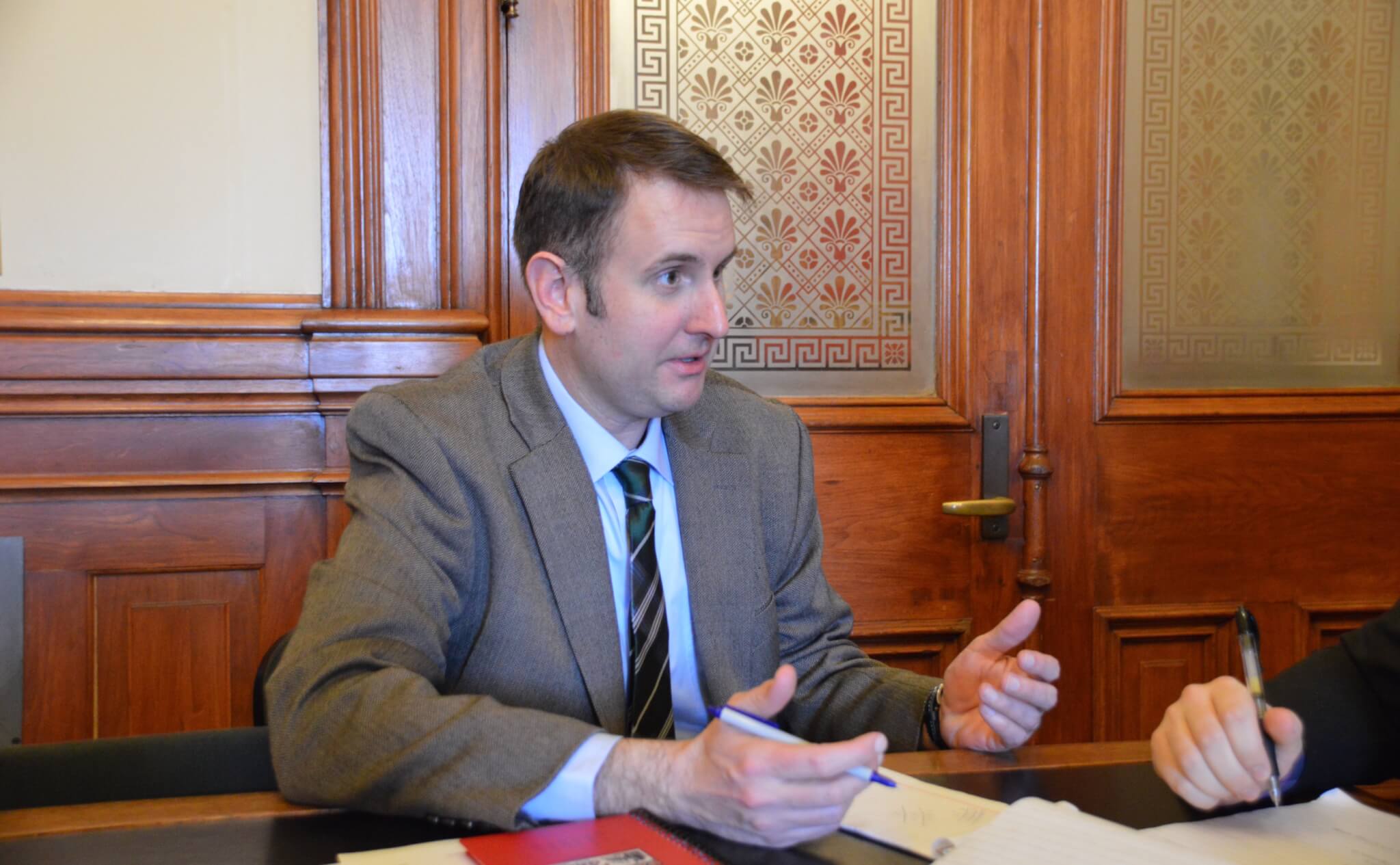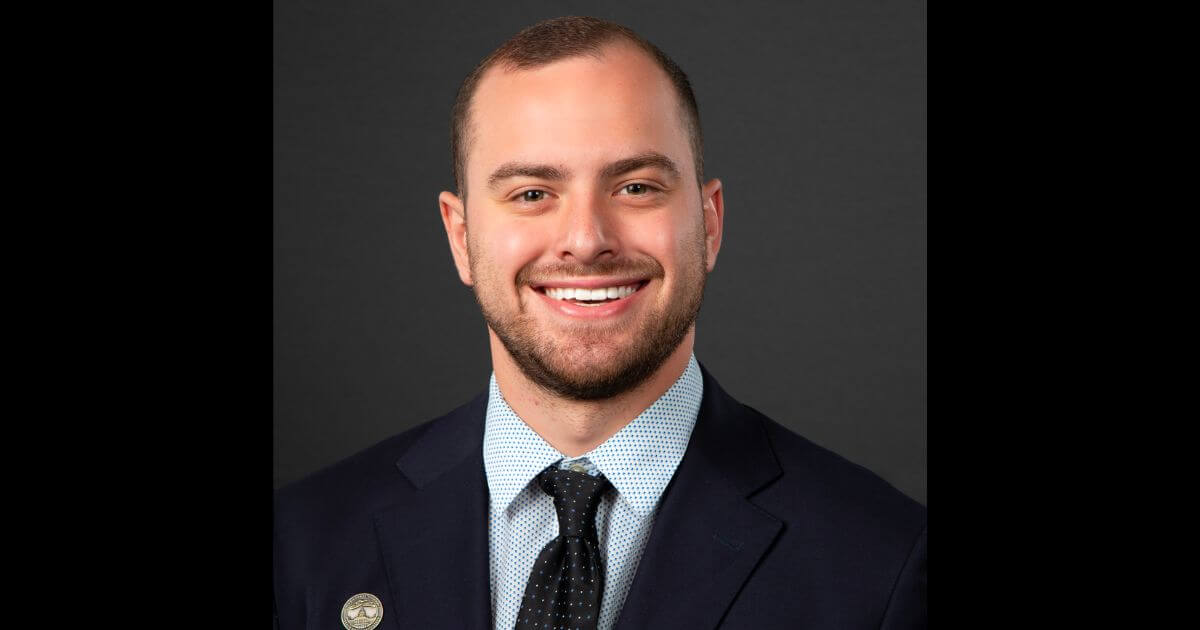
For a party that hasn’t seen a major, non-presidential statewide victory in over a decade, Iowa Democrats are looking for a special kind of candidate in 2018: one that can win. Friends of State Representative Todd Prichard believe he could fill that role, and Prichard is now strongly considering a run for governor.
On paper, Prichard, 42, fits many of the qualities Democrats say they want more of in their statewide candidates: an Iraq War veteran, younger, represents rural Iowa, and personally understands working-class issues. That certainly sounds to many like the profile of a Democrat who could win back the blue-collar and rural voters that moved away from the party in recent years.
But Prichard’s life story encompasses much more than just a few key points for a political resume. After growing up in poverty on the west side of Davenport, Prichard still sees the struggles of Iowa’s working class every day in his adopted hometown of Charles City. That’s kept his political outlook grounded in a concern for Iowa families that are fighting to get by.
“My parents were working poor,” Prichard explains in an interview with Starting Line. “That gives you an appreciation – when you see somebody stalled on the side of the road because they don’t have a good car, you’ve been in their shoes. Teaches some empathy.”
Early Life In Davenport
Born in 1974, Todd Prichard was raised in a family of five with two older sisters in Davenport. His parents were entrepreneurs who ran a carpet cleaning business.
“They were very hard workers, but never made any money,” Prichard recalls. “As a kid, you learned how to do without. My clothes were hand-me-downs. I remember not having insurance. If we were ever sick, we didn’t go to the doctor or dentist. It just wasn’t in the cards. I remember how much stress that created in my folks. They were always on the edge.”
The family’s mortgage payments were often behind, and Prichard remembers having to constantly worry about simple things like grocery money.
His father was interested in politics and twice campaigned for a seat in the Iowa House. He ran as a Republican in heavily-Democratic Davenport and lost badly.
Service In The Army And A Tour Of Iraq
While he was attending the University of Iowa, Prichard enrolled in the ROTC in 1996 and joined the Army for three years after college. He was stationed at Fort Hood and served a deployment in Kuwait in 2000. He came back home to Iowa in May of 2001, and started law school just before the events of September 11th.
Prichard stayed in the Iowa National Guard and was deployed to Egypt around the time most of his classmates were looking for post-law school jobs.
During all of that, Prichard had gotten married to his wife Ann, and they relocated to Charles City soon after to be closer to her family and to start one of their own. As soon as they did, however, Prichard got called up for another tour of duty, this time in Iraq.
“I left a two-week-old baby and came back to a two-year-old child,” Prichard notes.
Prichard served as a company commander of the National Guard’s 1st Battalion 133rd Infantry, made up of many soldiers from Northeast Iowa. Their job was to escort convoys, which Prichard likened to the work of state troopers, but in much more dangerous territory.
“It was a tough mission,” he says. “We lost two soldiers, one I considered close. We had our share of injuries from blasts. And there were a lot of lessons – Iraq was a war zone. Families were not safe in their homes. We were trying to help them stabilize a country. You see how fragile society is. Just delivery of basic services was an issue. We’d see people looking for firewood because there was no propane … You’d go by places where children were killed inadvertently by roadside bombs. It was a tough place, it was the wild west.”
Prichard now serves as a Lieutenant Colonel in the Army Reserve.

Prichard at his desk in the House
Running Drug Cases In Charles City
After graduating from law school, Prichard started his own small-town law practice in Charles City, population 7,500. He and Ann started their family of now five, with two daughters and one son. His wife, who grew up in Limes Springs, a tiny Iowa farming community in Howard County, teaches talented and gifted classes for elementary and middle school.
Prichard also works as a part-time prosecutor for Chickasaw County, where many of his cases revolve around drug use. Prichard worked with police to deal with informants in a way to disrupt drug dealers’ networks. That gave him a look into some of the toughest problems in rural Iowa that result from poverty and low-wage jobs.
“You were trying to get people out of addiction,” Prichard says of his work. “We dealt a lot with the trauma to a family with a parent who had criminal problems from addiction and drug use. You’d have children in need of assistance. There’s a lot of families in crisis – the majority of them – is because of addiction. There’s divorce, and loss of a job, but the vast majority of reasons children need assistance is because of addiction.”
Prichard was surprised to see how many of those drug users had not just one job, but many. Back during the meth epidemic in the early 2000’s, the county prosecutor’s office found people using meth to power them through two or three jobs during the day. And none of them had the resources to adequately treat their addictions.
Representing A Struggling Rural Iowa
Prichard and his wife were very active in local politics in Chickasaw County, getting involved in the John Kerry and Barack Obama campaigns. Then in late 2012, Brian Quirk, the conservative-leaning Democratic legislator for Charles City, took a job at a local electric utility and a special election was called. Quirk had a hand-picked successor in mind, but that person was rather conservative on a number of issues, so Prichard decided to throw his hat into the ring as well.
Prichard won the nominating convention and went to work in the dead of winter for the January 2013 special election. Through a lot of door-t0-door canvassing in sub-zero temperatures, Prichard found many voters struggling to get by in small-town Iowa. Parents in rural townships were frustrated with bussing for their children, some of whom were spending a full three hours to get back and forth to their schools. Others complained of a lack of access to mental health services. And the Sandy Hook massacre occurred during the campaign, so Prichard heard passionate feelings from both sides of the gun rights issue.
The biggest problem of all was good-paying jobs.
“The problem in North Iowa isn’t that there aren’t enough jobs,” Prichard explains. “The problem is there’s not enough that support a family, that support a middle-class lifestyle. We have a situation where people are living paycheck to paycheck. If they miss a week or a month of work, it’s financially disastrous. If they get injured somewhere, they don’t have the financial resources to survive that hit.”
And it doesn’t take much to fall behind in rural Iowa. While the cost of living is very low in Northern Iowa, the local wages mirror those costs and make it difficult for people to save up in case of emergencies.
“I knew a family that bought a nice, older house two blocks from me,” Prichard says. “They came to find out the roof was ruined. And it ruined them. What they thought was a $70,000 house they could afford ended up being a $15,000 fix. They literally couldn’t afford to live in their own house.”
Fighting In The Legislature To Keep Rural Communities Alive
While education is always a major focus for Democrats in the Statehouse, it takes on extra importance for a rural legislator like Prichard. But he was surprised how low a priority it was for many Republicans.
“If we lose our rural schools, we lose our community identification,” Prichard asserts. “A rural community’s survival depends on its ability to have good, quality local schools, where you don’t have to bus somebody an hour and a half. What family of three is going to move to a community where there’s no school?”

Prichard at the Statehouse
During his four years in the Iowa House, Prichard has emerged as someone who’s highly respected on both sides of the aisle.
“I don’t play partisan,” Prichard says. “At the end of the day, people just want state government to work. They want the services that they rely on. They want their money to be used appropriately. You approach the job as a pragmatist. If you’re doing the right thing it’s easy to defend.”
Re-tooling Democrats’ Message In 2018 For A Matchup With Kim Reynolds
Prichard had a front-row seat to Iowa’s shifting voter loyalties during the 2016 election. Northern Iowa saw some of the biggest swings away from Democrats in the entire country.
“Our message wasn’t connecting with voters. If you look at Howard County, where my in-laws live and do business in, the issues in Howard County are working-class, blue-collar issues,” Prichard thinks. “There’s a lot of workers there. They didn’t hear that we were helping with their issues. They heard that from Trump.”
A common misconception from those outside of Iowa (or even some in Iowa cities) is that the vast majority of rural counties are made up of farmers. In reality, much of small-town rural Iowa is just as blue collar as the north end of Dubuque or the southwest side of Cedar Rapids. Prichard believes Democrats are still the champions of working families, but that the party has work to do in getting their trust back.
Part of that comes from recruiting candidates who hail from outside of the metropolitan areas.
“I think we need to realize that we’re not Illinois,” Prichard explains. “We need more than the Democrats in Polk County. We need Democrats across the state to support our candidates. We can’t win elections by just focusing on the metropolitan areas.”
And he feels that despite recent voting shifts, Terry Branstad and Kim Reynolds have left themselves open to a specific line of criticism that can win those voters back.
“I’m so disappointed in the governor, always brags that he’s bringing jobs,” Prichard says. “They’re low-paying jobs. I’ve never seen a governor work so hard to bring low-paying jobs to the state … We’re at full employment, why are we trying to bring in low-paying jobs? Why don’t we upgrade the caliber of jobs we’re trying to attract to the state?”
Prichard points to Charles City as an example of a small town that has a decent mix of businesses, including two chemical plants that make medicine and vaccines, as well as small production shops that feed into the John Deere supply chain. The chemical plants provide actual decent-paying jobs, more of which could be coaxed to come to Iowa with the right priorities.
“Who is he championing?” Prichard asks of Branstad. “It’s not working Iowans, it’s businesses, many of which aren’t Iowa businesses.”
And Prichard says Reynolds’ signature item of STEM education and jobs could be a boon for rural Iowa – if she were actually supporting the funds for it.
“We give lip service to STEM,” he says. “She’s come to my district, to my school districts and given a lot of lip service to STEM education. But the reality is that these programs they want to be cheerleaders for and champion, they don’t provide the funding to do … Charles City had to cut $500,000 last year. You want to brag about STEM education? Those programs come with a cost.”
Chances In 2018
Despite his credentials and time spent in the Iowa House, Prichard isn’t the most well-known Democrat in activist and donor circles. The media market that includes his legislative district broadcasts mostly into Minnesota.
Were he to run, Prichard could face a formidable primary field. Andy McGuire is a proven fundraiser who made connections with party activists during her time as state party chair. State Senator Janet Petersen – who is starting to talk like someone planning a statewide run – has excited the base of the party in her defense of Planned Parenthood. And Rich Leopold might pull support from the more liberal voters in the state.
But Prichard will have a compelling personal narrative to run on, as well as a message that could convince Democrats he’s the one to lead the party back to victory at the top of the ticket. And were he prove to be a strong fundraiser, he has a team of knowledgeable advisers that can quickly form a professional campaign operation. All the pieces are there for a formidable candidacy that could put a fright into Reynolds and other Republicans.
Now he just needs to prove it.
by Pat Rynard
Posted 2/19/17

Lanon Baccam wins 3rd District Dem primary, will face Zach Nunn
Baccam defeats Melissa Vine to challenge Republican incumbent Lanon Baccam defeated Melissa Vine in Tuesday’s Democratic primary for Iowa’s 3rd...

Hardin County man running for office as Trump-loving Democrat to local party’s dismay
Brad Rewoldt, who recently changed his party affiliation from Republican, says his support of Trump will probably 'piss off' Democrats There is a...

Scheetz: Tax cuts for all Iowans, not just the wealthy
State Rep. Sami Scheetz says all Iowans should benefit from tax cuts via a sales tax reduction As a state representative, my job is to serve the...

Kalbach: What Iowa Republicans focused on during legislative session
Our state legislative session finished up towards the end of April, and I’m glad it’s over! From further de-funding and privatizing our public...

Advocates file suit to stop Iowa’s ‘unconstitutional’ immigration law
Immigration advocates filed a federal lawsuit Thursday to stop Iowa’s new immigration law—SF 2340—from taking effect arguing that the legislation...

Iowa Republicans make outlawing gay marriage key 2024 campaign priority
Iowa Republicans have made outlawing gay marriage a key goal in their 2024 party platform. During the Iowa GOP’s 2024 state convention on Saturday,...





